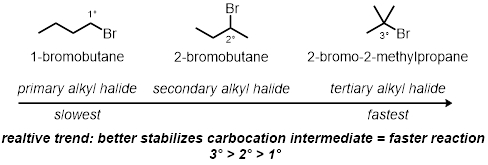Nucleophilic Substitution
Genel Bakış
Source: Vy M. Dong and Daniel Kim, Department of Chemistry, University of California, Irvine, CA
Nucleophilic substitution reactions are among the most fundamental topics covered in organic chemistry. A nucleophilic substitution reaction is one where a nucleophile (electron-rich Lewis base) replaces a leaving group from a carbon atom.
SN1 (S = Substitution, N = Nucleophilic, 1 = first-order kinetics)
SN2 (S = Substitution, N = Nucleophilic, 2 = second-order kinetics)
This video will help to visualize the subtle differences between an SN1 and SN2 reaction and what factors help to speed up each type of nucleophilic substitution reaction. The first section will focus on reactions that will help to better understand and learn about nucleophilic substitution reactions. The second section will focus on a real-world example of a substitution reaction.
Prosedür
Part 1: Studying SN1 Reactions
Alkyl Halide Structure:
- Measure 2 mL of a 0.1 M solution of silver nitrate in absolute ethanol into each of the three test tubes.
- Add 2 drops of 1-bromobutane into the first test tube. Add 2 drops of 2-bromobutane into the second test tube.
- Add 2 drops of 2-bromo-2-methylpropane into the final, third test tube.
- Stopper and shake each test tube.
- Note the time at which the first signs of cloudiness or pre
Sonuçlar
Başvuru ve Özet
These experiments are designed to quickly show trends in nucleophilic substitution reactions. Experimentally testing these trends helps to better understand the subtle differences between an SN1 and SN2 reaction. Chemists have learned to develop and optimize reaction conditions. It all stems from first understanding the reaction: what speeds up or slows down a reaction and how can we take advantage of it? Choosing the best solvent, temperature, or concentration of reagents can greatly affect how fas
JoVE Hakkında
Telif Hakkı © 2020 MyJove Corporation. Tüm hakları saklıdır
